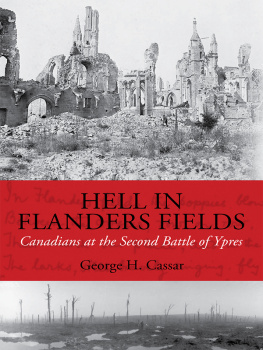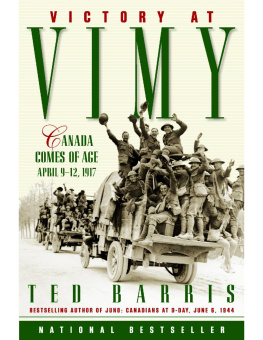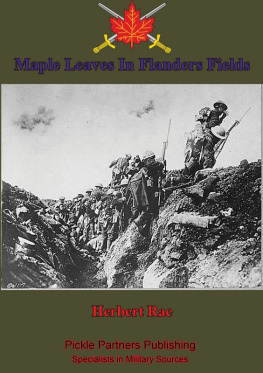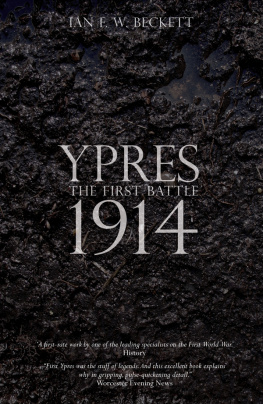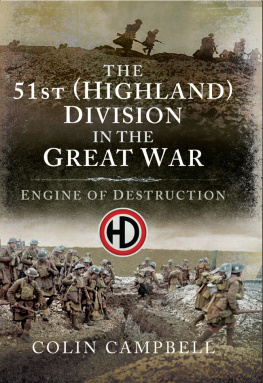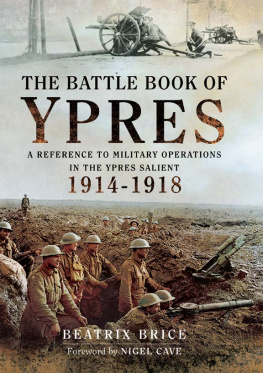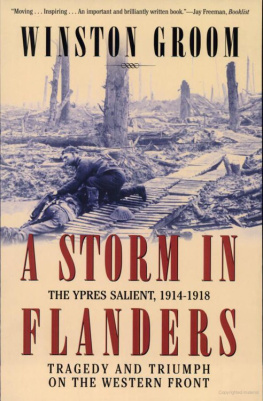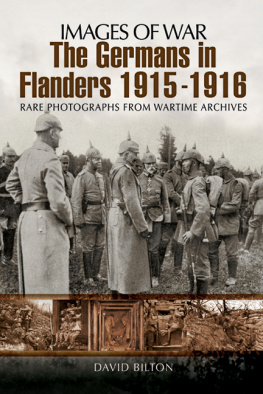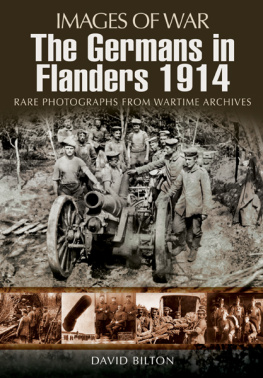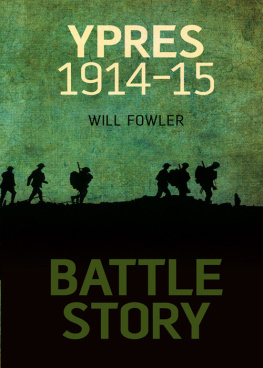
HELL IN FLANDERS FIELDS
ALSO BY GEORGE H. CASSAR
The French and the Dardanelles
Kitchener: Architect of Victory
Beyond Courage
The Tragedy of Sir John French
Asquith as War Leader, 19141916
The Forgotten Front: The British Campaign in Italy, 19171918
Kitcheners War, British Strategy from 1914 to 1916
Lloyd George at War, 19161918
A Survey of Western Civilization (co-author)
World History (co-author)
HELL IN
FLANDERS FIELDS
Canadians at the Second Battle of Ypres
George H. Cassar

Copyright 2010 George H. Cassar
All rights reserved. No part of this publication may be reproduced, stored in a retrieval system, or transmitted in any form or by any means, electronic, mechanical, photocopying, recording, or otherwise (except for brief passages for purposes of review) without the prior permission of Dundurn Press. Permission to photocopy should be requested from Access Copyright.
Editor: Shannon Whibbs
Design: Courtney Horner
Printer: Transcontinental
Library and Archives Canada Cataloguing in Publication
Cassar, George H.
Hell in Flanders Fields : Canadians at the second battle of Ypres / by George H. Cassar.
Includes bibliographical references and index.
ISBN 978-1-55488-728-6
1. Ypres, 2nd Battle of, Ieper, Belgium, 1915. 2. Canada. Canadian Army--History--World War, 1914-1918. I. Title.
D542.Y7C39 2010 940.4'24 C2009-907532-6
1 2 3 4 5 14 13 12 11 10

We acknowledge the support of the Canada Council for the Arts and the Ontario Arts Council for our publishing program. We also acknowledge the financial support of the Government of Canada through the Canada Book Fund and The Association for the Export of Canadian Books, and the Government ofOntario through the Ontario Book Publishers Tax Credit program, and the Ontario Media DevelopmentCorporation.
Care has been taken to trace the ownership of copyright material used in this book. The author and the publisher welcome any information enabling them to rectify any references or credits in subsequent editions. J. Kirk Howard, President
Printed and bound in Canada.
www.dundurn.com Dundurn
Dundurn Press
3 Church Street, Suite 500
Toronto, Ontario, Canada
M5E 1M2 | Gazelle Book Services Limited
White Cross Mills
High Town, Lancaster, England
LA1 4XS | Dundurn Press
2250 Military Road
Tonawanda, NY
U.S.A. 14150 |
To Bruce and Vicki
And to the memory of Joel
CONTENTS
While doing research on an unrelated topic in the Public Record Office (now British National Archives) in 1981, I inadvertently came across a folder of correspondence between Colonel A. Fortescue Duguid, then Canadian director of the Historical Section, and Brigadier-General Sir James Edmonds, the British Official Historian. It began after Duguid read the first draft of Edmondss official account of the Second Battle of Ypres and transmitted his comments in 1925. The exchange of letters, often heated and less than civil, continued until the publication of the British Official History in 1927 it would resume again in the mid-thirties while Duguid was writing the Canadian side of the battle. Duguid contended that Edmonds had deliberately played down the role of the Canadians while dwelling on the heroics of the British, and he proceeded to show, on a number of occasions, the points of differences between the two. Edmonds corrected factual errors in his second draft, but not the slant of his narrative. Duguid speculated that the trumpeting of the valiant Canadian stand by both allies and adversaries, often ignoring or only mentioning in passing the presence of the British, had riled Edmonds and that it was his way of trying to set the record straight. Duguid pointed out to Edmonds that it was possible to acknowledge the great gallantry of the British soldiers without giving the Canadians short shrift. However, Edmonds refused to budge, insisting that if the Canadians were unhappy with his account then, like the Austrailians, they should write their own history.
As it happened, Duguid had already been commissioned by the Canadian government to do just that. In the next half-dozen years he accumulated a wealth of relevant material and, in the early 1930s, began the process of writing. His first volume was published in 1938 and focused on the Canadian Armys baptism of fire at Ypres. It was clear, well-written, comprehensive, generally free of mistakes, and went far toward rectifying the imbalance in Edmondss account and according the Canadians their just due. But Duguid, as with any official historian, had to work under restrictions and there were many incidents that were treated superficially or omitted altogether.
It was with the object of presenting a more rounded picture that I undertook the task of researching and writing about the Canadians at the Second Battle of Ypres. The publication of my book Beyond Courage in 1985 was the first account of the struggle since the publication of the Canadian Official History. To a great extent the study was based on sources housed in the Canadian National Archives in Ottawa official documents, private papers, and interviews of the survivors of the battle conducted by the CBC for its 17-part series on the First World War, which aired in 1964. In describing the events, I brought to light new information, much of which was known to Duguid, but deemed unsuitable in an official history written at a time when most of the leading participants were still alive. Still, Beyond Courage integrated few examples of eyewitness testimony not trendy then and, as a pioneer work, was hardly free of flaws.
After mulling it over off and on for a few years, I finally decided to revise the study in 2007. This seemed like a propitious time to do so. Since Beyond Courage first appeared, there have been several studies of the battle that have used additional personal records, plus the publication of a plethora of biographies, diaries, memoirs, and letters of the participants. On top of this, the Internet, a new discovery, had become an invaluable tool of the scholar. Over the course of my research for this book, I relied not only on Canadian documentary evidence and virtually all available material in print, but also on hitherto untapped sources drawn from British archives. While making amends for earlier sins of omission and commission, I folded in much new material and greatly increased the recollections of individuals who fought face to face with the enemy so as to provide a more evocative and stirring narrative. The result is a more accurate and much fuller account than the earlier version and one which I trust will bring home the hardship, pain, and exhilaration of those who lived through the battle. Thus, since the new product is quite different from the old one it seemed appropriate to change the title of the book.
Few battles in the First World War are as difficult to follow as Second Ypres. There were many instances where battalions were temporarily detached from their brigades and divisions and added to other formations. Moreover, the nature of the fighting was confusing as troops were constantly moving from place to place. Finally, the overburdened staff officers had little time to attend to their units war diary so that details of much of the fighting were lost permanently. My hope is that this narrative will help dispel the fog of war, or at least a good part of it, and make the battle more comprehensible to the reader.
Next page
